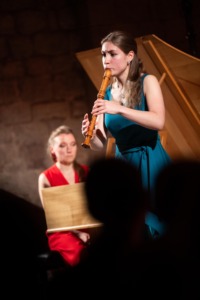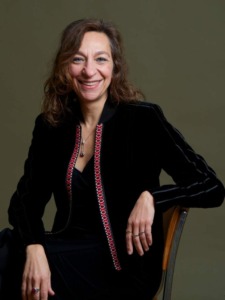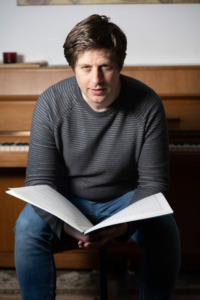Lucie Horsch has commissioned three new works as part of her 2022 BBT Artists Fellowship. Two are premiered in 2024, with the third following in 2025. She has written us a blog about the process.
Commission No 1
On A Song for You by Calliope Tsoupaki for recorder and harpsichord, premiered in Ghent at the Bijloke on 13 April 2024, by Lucie Horsch and Olga Pashchenko

Lucy Horsch recorder and Olga Pashchenko harpsichord
As a recorder player, one of the most common settings for a chamber music recital is the combination of recorder and harpsichord. This is probably the type of programme that I have performed the most so far and will continue to do so throughout my life. The instrument combination of recorder and harpsichord is often seen as a traditional one, eminently suited to the large Baroque repertoire available. But what is interesting, is how both instruments individually have also been adopted by countless contemporary composers. Probably the histories of the recorder and the harpsichord are the reason for this, as both instruments were similarly ‘re-discovered’ in the 21st century. This meant that they played not only a significant role in the new historically-informed music practice, but simultaneously contemporary composers started using them for their compositions.
However, it is quite surprising that even though both the recorder and harpsichord individually have had many compositions written for them, for the two instruments together I was not able to find any available contemporary repertoire. Therefore, it is very significant to have this new duo piece by Calliope Tsoupaki. She has written for the recorder before, so she knows the instrument well. Tsoupaki told me afterwards that she thought of our personalities while composing her piece. She wanted to write something beautiful but also playful, with a lot of rubato and which would offer us the possibility to create our own sound world and interpretation. It is indeed a work which, I feel, depends very much on musicality.
Tsoupaki originally wrote it for tenor recorder, but I suggested to perform it on voiceflute instead, as the piece is a ‘song’ and this type of recorder is often admired for its association with the human voice, hence the name ‘voiceflute’. Tsoupaki liked this idea and, because the tenor and voiceflute are very close in range, the piece fits perfectly and no changes had to be made.

Calliope Tsoukapi photo © Michiel van Neiuwkerk
When I delivered the programmes for our recitals at the Bijloke – and a few days later in Barcelona – I didn’t yet know what kind of piece Tsoupaki would write. But I chose to place it at the beginning of the second half, so that the listeners would come back in with fresh ears and be open and ready for some new music. I also decided to place a very short two-minute piece by György Kurtág before A Song for You as a kind of introduction. It’s the so-called ‘Sappho-Fragment’ from Kurtág’s Signs, Games and Messages, based on ancient Greek text by the poet Sappho. Calliope Tsoupaki is of Greek origin, so I thought that this Kurtág piece could connect well with her new composition. I was in any case planning to play the short ‘Sappho-Fragment’ on voiceflute, so it ended up being the perfect prelude to Tsoupaki’s new piece. It was fantastic to surprise the audience in Ghent and a few days later in Barcelona with A Song for You, which highlights the vocal sonority of my instrument.
When designing concert programmes, it is of the utmost importance to me, as a musician, to show my versatility as an artist, as well as the versatility and potential of my instrument. Therefore, having the possibility of adding a newly written commission to my repertoire, is a huge advantage. Not only for the audience – as prejudices still exist about the recorder being ‘just a Baroque instrument’ – but also for concert organisers, for whom a new piece can be an added incentive to invite me to their series. What I particularly like about Calliope’s piece, is how she has chosen to use the ‘traditional’ sonority of the recorder. It connects with the listener because it evokes the association with the human voice and highlights the emotional capabilities of the recorder, which is exactly what I am trying to convince the listeners of, when designing a concert programme.
Watch Lucie and Olga play A Song for You here
Commission No 2
On Fetiapoipoi by Reza Namavar, concerto for recorder and Baroque ensemble, to be premiered in Utrecht Tivoli Vredenburg on the 23 May 2024, by Lucie Horsch and the Orchestra of the Eighteenth Century

Reza Namavar
These last few months have been an exciting time with lots of new music in my agenda. With the help of my BBT Fellowship, I commissioned another new piece for recorder, this time a concerto from Dutch composer Reza Namavar, which will be part of a Baroque programme with the Orchestra of the 18th Century alongside music by J.S. Bach and A. Vivaldi. With this programme, including Namavar’s new concerto, we will go on tour at the end of May 2024 and again in November and December 2024.
The reason that I approached Reza Namavar for this commission, is his strong affinity with the music of Antonio Vivaldi. I asked him to write in the style of a Vivaldi concerto for Baroque orchestra (including parts for harpsichord and theorbo). The result is a very fiery piece for different types of recorder, with three movements, fast – slow – fast, corresponding to the structure of most of Vivaldi’s instrumental concerti. The three movements bear Tahitian titles, the first is titled ‘Pouri’, meaning darkness, the second movement ‘Fetiapoipoi’, the morning star rises, and the last movement ‘Poipoi’, the morning. So within the piece there is a development from darkness to light.
Our programme is entitled ‘The Voice of the Recorder’, as we showcase the vocal cantata origins of many of the instrumental concertos by J.S. Bach. There is also an actual aria included by Vivaldi, titled ‘Sovente il sole’, which I will perform as a mezzo soprano. The translation of this aria is ‘often the sun shines more beautiful and vague in the sky, if a dark cloud has managed to obscure it’. The contrast between light and dark (‘chiaroscuro’) is one of the most important principles of Baroque art and music. Throughout our programme, we hear both the human voice and the recorder. This is also the case in Namavar’s concerto. In the slow middle movement there is a passage written for mezzo soprano, on the text of Vivaldi’s aria ‘Sovente il sole’ which already featured earlier in the programme.
This piece by Reza Namavar elevates our programme and also brings it together thematically. I very much like the idea of connecting newly written music to existing music, as it allows the listener to feel more connected with its language. Reza Namavar employs similar compositional techniques to Vivaldi, for example abrupt contrasts between solo and tutti passages, as well as using short motifs, which are then expanded. As with Calliope’s new piece, the introduction of Reza’s concerto lends a sense of immediacy to a mostly Baroque programme. The existing prejudice against Baroque music is that it is not innovative, but it becomes topical again, when combined with new music that has a clear connection to it.
Listen to Luice play Fetiapoipoi with the Orchestra of the 18th Century here
Commission No 3
Concerto for recorder and symphony orchestra by Lotta Wennäkoski, to be premiered at the Concertgebouw in Amsterdam in October 2025, by Lucie Horsch and the Royal Concertgebouw Orchestra
To be continued….
